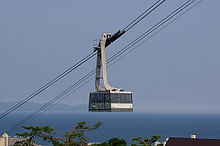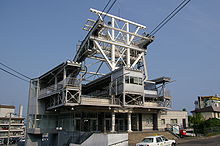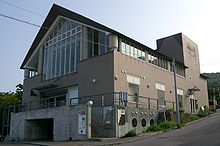- Mount Hakodate Ropeway
-
 Mt. Hakodate Ropeway. The background is Tsugaru Strait.
Mt. Hakodate Ropeway. The background is Tsugaru Strait.
The Mt. Hakodate Ropeway (函館山ロープウェイ Hakodateyama Rōpuwei) is the name of an aerial lift, as well as its operator. The line climbs Mount Hakodate in Hakodate, Japan. As of 2004, this is the most heavily used aerial lift line in Japan, transporting 1,559,000 riders yearly. [1] The aerial tramway was prominently featured in Noein, a 2005 anime.
Contents
Basic data
- System: Aerial tramway, 2 track cables and 1 haulage rope
- Distance: 787 m (2,582 ft)
- Vertical interval: 278 m (912 ft)
- Maximum gradient: 28°
- Operational speed: 7 m/s
- Passenger capacity: 125
History
- 1958: Hakodate Tour System (函館観光事業) opened the aerial tramway line of 31 passenger capacity.
- 1959: For the benefit of tourists, the company opened an observation deck, a restaurant and a souvenir shop at the summit.
- 1965: The operator started taxi business.
- 1970: The gondolas were modified to allow 45 passenger capacity.
- 1975: The company's taxi division was spun off into a separate company.
- 1976: Hakodate Tour System changed its name to Mt. Hakodate Ropeway Corporation.
- 1978: The company opened a cafe restaurant called Motomachi Ichibankan near Sanroku Station.
- 1986: The operator became the third sector company. The line and the observation deck were modified.
- 1992: The company opened FM Iruka, the first community FM radio station in Japan.
- 1993: Cafe Pelra opened.
- 1997: New gondolas were imported from Austria.
Services
Cabins operate once for 10 minutes. The whole ride takes 3 minutes. The fare costs ¥640 one-way, or ¥1160 for a round-trip.
Stations
Station name Japanese Distance Elevation Transfers Location Sanroku
(submontane)山麓 0 m 56 m 10 minutes walk from Jūjigai Station, Hakodate City Tram ■ Route 2 or ■ 5. Hakodate, Hokkaidō Sanchō
(summit)山頂 787 m 334 m See also
External links
- (English) Mt. Hakodate Ropeway official website
- (Japanese) Mt. Hakodate Ropeway official website
- (Japanese) FM Iruka official website
Categories:- Aerial tramways in Japan
- Japanese rail company stubs
- Japanese cable line stubs
Wikimedia Foundation. 2010.


